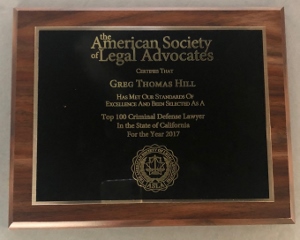Do Warrants Eventually Expire If Police Do Not Arrest You?
As the inquisitive reader to this article may realize, a judge can issue a bench warrant and police may never find the person who the judge wants to see.
Our office once had a client who had a bench warrant outstanding for 42 years. A judge in Pomona had issued a bench warrant when our then 19-year-old client failed to appear in court. Our client moved to a town on the Arizona-California border and never heard anything about the warrant until one day when stopped for speeding. The officer told him that our client had a bench warrant outstanding in Pomona. Our client was astonished, as he did remember the case, but had been stopped multiple times without ever being told by police about this warrant.
Summary in 30 Words or Less: Warrants do not expire after a certain period of time like many hope. Likewise, there is no statute of limitations applicable to one being arrested on a warrant.
In other words, bench warrants do not expire. They are not automatically deleted after, for example, five years if the police fail to find the subject of the warrant. Indeed, the warrant will remain outstanding until the subject dies, unless the judge otherwise recalls or quashes it for some other reason.
This reality has become increasingly clear to many as Live Scan and other criminal history databases have recently increased their records to reach back into the late 1970’s now (mid-2016). We have had clients from outside California call us to resolve bench warrants they did not even know existed for cases in Torrance, Long Beach, Inglewood, Compton and other courts in Los Angeles and Orange County.

The client then calls us and explains what his employer told him. We then go to the courthouse and try to get the docket for the case or the last minute order in it that shows a warrant was issued and when.
A second very common situation is that the client will call us to say that the DMV had placed a hold on the client’s license and will not let the client renew the license until the warrant is lifted (also known as set aside or quashed).
The reason warrants do not expire is because if they did, such a consequence would encourage anyone who is wanted by a judge to evade the warrant until it expired. The person would be rewarded for being defiant to the judge’s order to appear.
Warrants, by the way, are not always bench warrants, although bench warrants are the most common. There are also arrest warrants, search warrants, complaint warrants, execution warrants (also called death warrants) and Ramey warrants, each of which are issued for distinctly different reasons and at different stages of a case. An arrest warrant, search warrant, complaint warrant and a Ramey warrant could become moot, however, due to the passage of time making the filing of a complaint based thereupon barred by a statute of limitations. A Ramey warrant usually expires after 90 days from the date it was issued.
What we recommend in dealing with any warrant is to first clarify exactly what type of warrant it is. If the client is not aware what type of warrant it is, but knew that they faced a case in court at one time (and may have gone to court), the highest likelihood is that the warrant is a bench warrant.
Depending upon the amount of time that has passed since the warrant was issued and the type of case involved (felony or misdemeanor), an attorney may be able to appear in court without the client being present to have the warrant lifted, recalled or quashed. This is generally not possible when the case is a felony matter.
To find out more about how to handle a warrant, we invite you to call us at 310-782-2500 or send us an e-mail at [email protected].
For more information about issues relating to warrants, appearing in court and bail bonds, click on the following articles:
Contact Greg Hill & Associates
 Greg Hill & Associates Home
Greg Hill & Associates Home




















